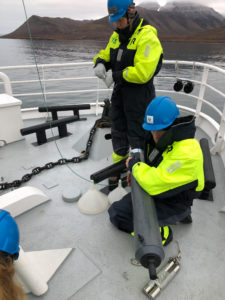 The aim of this project is to investigate potential changes in biodiversity, community composition and function of microbial eukaryotes with respect to the changing climate in the Arctic
The aim of this project is to investigate potential changes in biodiversity, community composition and function of microbial eukaryotes with respect to the changing climate in the Arctic
Project description:
Microbial eukaryotes or single-celled protists are organisms that play a fundamental role in energy flow and the cycling of elements in the marine ecosystem. They can be classified as primary producers, consumers, decomposers, forming important trophic links in the marine food web. Protist communities in the Arctic are highly seasonal with winter and early spring communities being more diverse than summer/autumn communities. Despite the abundance and importance of pico- (0.2-2µm) and nano- (2-20µm) sized eukaryotes, most protist research so far has focused on larger organisms that can be studied under a microscope. Hence it was because of these limitations that until recently, marine eukaryotes were treated as an inherent black box: something that was difficult to assess. However, recent advances in molecular techniques have made it possible to address “who is there” and “what are they doing”, even for pico- and nano-sized protists, at the same time avoiding cumbersome microscopic analysis. Molecular methods are independent of morphology and instead use information from DNA sequences to identify organisms and classify them based on their evolutionary relationships.
This study takes place at the IsA (Isfjorden-Adventfjorden) time series station which has been maintained by UNIS since 2011. The station is used to study the baseline biodiversity of microbial eukaryotes and zooplankton, as well as interannual variations in organisms and environmental factors. A recurrent monthly marine sampling on board the UNIS polar circle and Polarsyssel will take place in order to collect water samples which will further be used for filtrations and several molecular analysis. These analyses will help in studying the seasonal variations or change in diversity due to climate change that occurs within the protist communities.
Tasks:
The field work includes collecting water samples from the UNIS polaris boat (during summers/autumn) and Polarsyssel (during winters/spring). The student will also participate in labwork (filtrations).Key words: CTD’s, Plankton nets, filtrations, water sampling, marine ship based fieldwork.The student should be ready to work in cold-harsh arctic conditions during samplings and be capable of working on boats.
The project involves:
This project involves field (monthly) and related lab work.
Starting date/period:
1 Feb – 1 June 2020
Experience/skills to be acquired:
The student would be qualified to work at sea under Arctic conditions to collect biological samples and learn filtration techniques.
Involvement:
The student will be involved in working alongside the PhD candidate helping out during the fieldwork and labwork once a month. It would be preferable for the student to work until the summer of 2020.
Interested by this project? Need more info? Contact:
Cheshtaa Chitkara
Project number: 8
